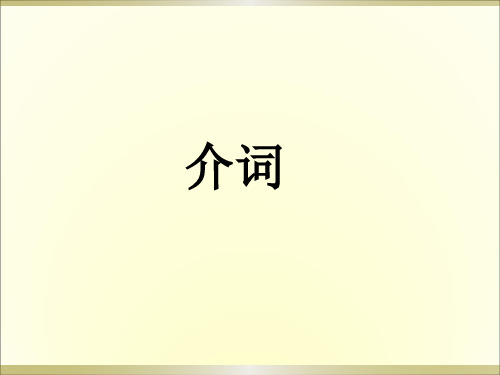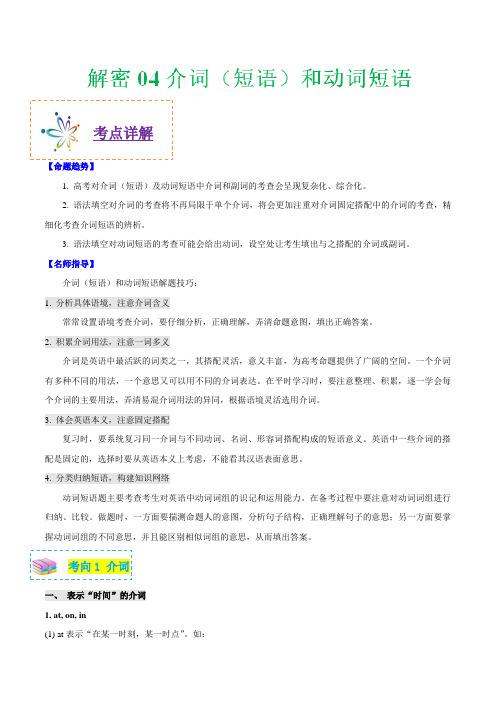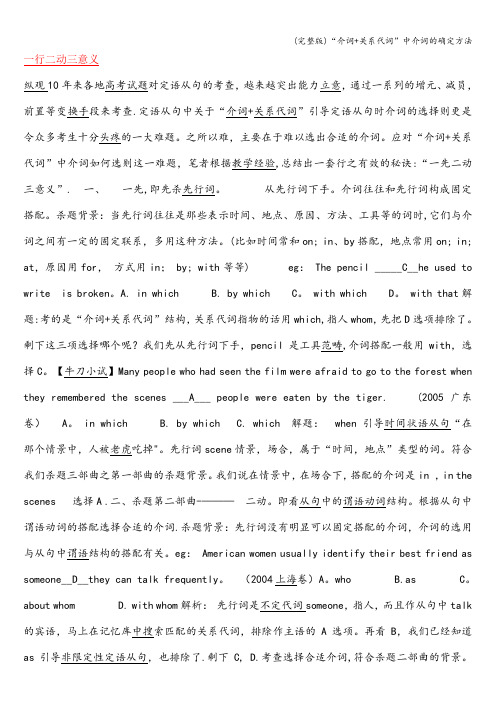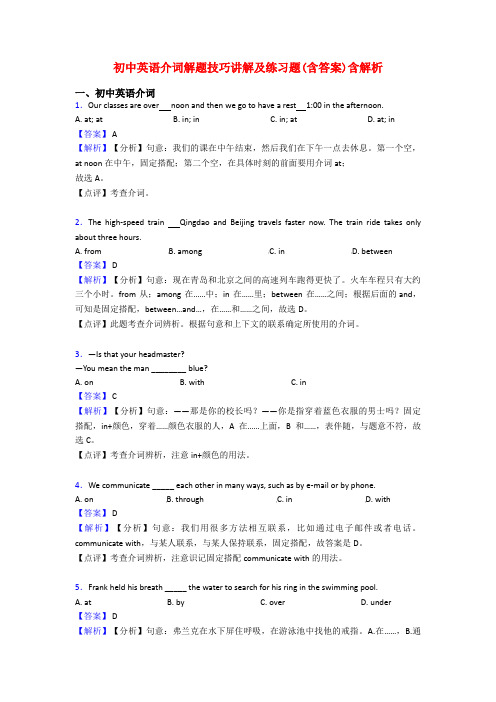介词常用的解题技巧
高考英语语法填空技巧分类突破:介词

短语介词: according to 、 out of 、 because of、 by means of、 in spite of 、 instead of
双重介词 : from behind /above / under , until after
分词介词 :considering , including , judging from /b
8. On 与 about 区别
简单区分:about通俗大众;on学术【专业】性强
on与about 二者都是介词,意为“关于,论及” 等,一般情况下,二者可以互相替换,但二者有 点区别:about常用于简单的或浅显的论述等,是 一般用语,多用于讲故事,谈话;思考等; on多 用于系统论述或专题讲演、论著等,具有学术性, 如:The teacher told us a story about Lei Feng. It's very moving. He will give us a talk on the history of the Party.他将给我们做个关于 党史的报告。
10 表原因的介词:
for , because of , due to , owing to , on account of , as a result of 1. He didn’t come to the meeting ______ his illness 2. The reason ______ his being angry is that he lost his cell phone. 3. ______ a heavy snow , the highway has been closed up. 4. The accident is ______ the driver’s drinking .
介词使用方法归纳

介词使用方法归纳介词是连接名词、代词、动词或其他词语与其后常跟的名词短语、动词短语或从句的一种词类。
以下是介词的一些使用方法归纳:1. 表示时间:at, in, on, during, before, after, until等。
例如:at 9 o'clock, in the morning, on Monday, during the summer, before dinner, after school, until tomorrow等。
2. 表示地点:in, on, at, by等。
例如:in the room, on the table, at the park, by the river等。
3. 表示方式:by, with等。
例如:by car, with a smile等。
4. 表示原因:because of, due to等。
例如:because of the rain, due to the traffic等。
5. 表示目的:for, to等。
例如:for fun, to learn等。
6. 表示比较:than等。
例如:bigger than, taller than等。
7. 表示关系:of, to等。
例如:a book of poetry, a friend to me等。
8. 表示顺序:at, above, below, beside等。
例如:at the top, above the line, below the surface, beside the lake等。
9. 表示方式:with, by等。
例如:with a pen, by train等。
10. 表示动作发生的对象:to, for等。
例如:give the book to me, buy a gift for him等。
需要注意的是,介词的使用往往需要根据具体的语境而定,所以在学习和使用中需要不断积累和理解具体的用法。
解密04 介词(短语)和动词短语-备战2019年高考英语之高频考点解密

【命题趋势】1. 高考对介词(短语)及动词短语中介词和副词的考查会呈现复杂化、综合化。
2. 语法填空对介词的考查将不再局限于单个介词,将会更加注重对介词固定搭配中的介词的考查,精细化考查介词短语的辨析。
3. 语法填空对动词短语的考查可能会给出动词,设空处让考生填出与之搭配的介词或副词。
【名师指导】介词(短语)和动词短语解题技巧:1. 分析具体语境,注意介词含义常常设置语境考查介词,要仔细分析,正确理解,弄清命题意图,填出正确答案。
2. 积累介词用法,注意一词多义介词是英语中最活跃的词类之一,其搭配灵活,意义丰富,为高考命题提供了广阔的空间。
一个介词有多种不同的用法,一个意思又可以用不同的介词表达。
在平时学习时,要注意整理、积累,逐一学会每个介词的主要用法,弄清易混介词用法的异同,根据语境灵活选用介词。
3. 体会英语本义,注意固定搭配复习时,要系统复习同一介词与不同动词、名词、形容词搭配构成的短语意义。
英语中一些介词的搭配是固定的,选择时要从英语本义上考虑,不能看其汉语表面意思。
4. 分类归纳短语,构建知识网络动词短语题主要考查考生对英语中动词词组的识记和运用能力。
在备考过程中要注意对动词词组进行归纳、比较。
做题时,一方面要揣测命题人的意图,分析句子结构,正确理解句子的意思;另一方面要掌握动词词组的不同意思,并且能区别相似词组的意思,从而填出答案。
一、表示“时间”的介词1. at, on, in(1) at表示“在某一时刻,某一时点”。
如:☞I get up at 6:00 every day. 我每天6点起床。
注:at daybreak在黎明at noon在中午at night在夜间at Christmas在圣诞节期间at the age of five在五岁时(2) on表示“在具体某一天或某天的上、下午”。
如:☞I heard a shot on (the morning of ) March 18. 三月十八日(早晨) 我听到一声枪响。
英语介词解题技巧(超强)及练习题(含答案)

英语介词解题技巧(超强)及练习题(含答案)一、选择题1.A study shows that rude languages spoken to children may have bad results that go ________ those of beating them.A.against B.beyond C.except D.with2.The workers will build a new road ________ the two villages.A.from B.among C.at D.between3.— Excuse me, will you please tell me the way to Yangzhou State Guesthouse?— Walk ______ the bridge and go straight on, and you will see it on your left.A.over B.above C.across D.into4.My mum searched ________ the messy books and found my pencil was under a Harry Potter. A.as B.across C.through D.for5.—The earthquake in Ya’an took place ________ two past eight ________ the morning of April 20th.—Yes, some people were still sleeping for it was weekend.A.in; on B.on; in C.at; in D.at; on6.V olunteering is a good way to experience life ________ the campus (校园). Take an active part in it, and you will learn more about the world.A.over B.beyond C.against D.above7.In western countries, children play “trick or treat” ________ the evening o f October 31st. A.at B.in C.on D.to8.It is a good idea to experience life ________ the school by volunteering. Take an active part in it, and you will make a difference to the world.A.above B.beyond C.over D.against 9.Armstrong joined the navy in 1949 and served _______ a pilot for three years.A.with B.like C.to D.as10.The ending of the film Diary of Dinosaurs was so surprising and fully went ________ my imagination.A.across B.over C.through D.beyond11.The exercise was __________ the abilities of most students, so very few could work it out. A.beyond B.over C.against D.through 12.Sometimes I feel stressed because what my parents want me to do has gone ________ my ability.A.through B.against C.above D.beyond13.I like reading. I often fill my bookshelf ________ all kinds of books, like novels, detective stories, and so on.A.on B.in C.with D.of14.He was born ________ Feburary, the coldest month of a year in this city.A.on B.in C.at D.over15.Some of the technology we’ve seen on screen is ________ our ability to create. But that might not be true for long.A.against B.during C.beyond D.through 16.—It’s raining heavily outside. May I push my bicycle into your house?—Certainly. But please put it _________ the wall so that it won’t take up too much space. A.in B.on C.against D.over17.—I can’t think of any other actress who is more beautiful than Audrey Hepburn.—You’ve got the point. Her beauty is ________ words and she succeeded ________ hard work. A.over; by B.over; throughC.beyond; by D.beyond; through18.—When is your birthday?—My birthday is ________ August 21st.A.on B.at C.in D.for19.The girl is ________ a singer ________ everyone in her hometown.A.well known as; for B.well-know as; toC.well known as; to D.best known for; for20.—My aunt’s 3-year-old daughter can eat a meal with chopsticks.— Really? Most children ________ her age still use spoons.A.of B.in C.on D.for21.—I haven’t been to Shenzhen for years.—You really need to pay a visit, and you’ll find changes there are ________ imagi nation. A.beyond B.through C.without D.for22.—A serious study of physics is impossible ________ some knowledge of maths.—I couldn’t agree more. So we should also learn maths well.A.among B.between C.against D.without 23.Xuzhou Metro Line 2 came into use ________ November 28, 2020, it is one of the most important events in our daily life.A.at B.in C.on D.for 24.—Thanks for looking after me ________ my illness, Millie.—Don’t mention it. That’s what friends are for.A.through B.among C.with D.across 25.—Why can’t we drive in the emergency lane (应急车道) on expressway?—Because the lane makes it possible to race ________ the clock to save people’s lives. A.beyond B.over C.against D.through 26.—Thanks for looking after me ________ my illness, Millie.—Don’t mention it. That’s what friends are for.A.beyond B.through C.across D.with27.The story The Ugly Duckling ________ Hans Christian Andersen has remained popular among children for centuries.A.in B.on C.by D.with28.We have a party ________ the evening of October 31.A.in B.at C.on D.by29.During the online learning, some parents were too impatient________ their children to solve the problem ________ a proper way.A.in; with B.with; in C.for; in D.to; with30.The exercise is ________ my ability and it’s hard for me to work it out.A.over B.against C.beyond D.through 31.Don’t be afraid of difficulties. Remember: kites rise highest ________ the wind, not with it. A.over B.against C.across D.along32.In the end, Mr Song came up____a good method to solve the problem.A.for B.at C.in D.with33.Peter is clever enough to read and write __________ the age of 4.A.between B.at C.to D.during34.— The Dragon Boat Festival falls_______May or June every year.—Yes, this year’s Dragon Boat Festival is_______June 25th.A.in; on B.on; in C.in; in D.on; on35.—I’ve been a League member for about two years. What about you?—I joined the League ___________May, 2017.A.in B.on C.at D.by36.China sent up the final satellite of Beidou Navigation Satellite System(北斗卫星导航系统) from Xichang Satellite Center___________ June 23,2020.A.at B.in C.to D.on37.Family is always _________ me, so I can follow my dreams with great courage. A.beyond B.forward C.past D.behind 38.—Jack, you should put the things away in your room. It is ________ a terrible mess!—OK, I’m coming, Mum!A.on B.at C.in D.for39.—There have been great changes in Taizhou in the past few years.—I can't agree more. The changes there are ________ my imagination.A.near B.past C.along D.beyond40.The teacher encouraged the students to tell the story ________ English.A.at B.with C.in D.for【参考答案】一、选择题1.B解析:B【详解】句意:一项新调查表明,对孩子大喊大叫可能比揍他们的后果更严重。
(完整版)“介词+关系代词”中介词的确定方法

一行二动三意义纵观10年来各地高考试题对定语从句的考查,越来越突出能力立意,通过一系列的增元、减员,前置等变换手段来考查.定语从句中关于“介词+关系代词”引导定语从句时介词的选择则更是令众多考生十分头疼的一大难题。
之所以难,主要在于难以选出合适的介词。
应对“介词+关系代词”中介词如何选则这一难题,笔者根据教学经验,总结出一套行之有效的秘诀:“一先二动三意义”.一、一先,即先杀先行词。
从先行词下手。
介词往往和先行词构成固定搭配。
杀题背景:当先行词往往是那些表示时间、地点、原因、方法、工具等的词时,它们与介词之间有一定的固定联系,多用这种方法。
(比如时间常和on; in、by搭配,地点常用on; in; at,原因用for,方式用in; by; with等等) eg: The pencil _____C__he used to write is broken。
A. in which B. by which C。
with which D。
with that解题:考的是“介词+关系代词”结构,关系代词指物的话用which,指人whom,先把D选项排除了。
剩下这三项选择哪个呢?我们先从先行词下手,pencil是工具范畴,介词搭配一般用with,选择C。
【牛刀小试】Many people who had seen the film were afraid to go to the forest when they remembered the scenes ___A___ people were eaten by the tiger. (2005广东卷) A。
in which B. by which C. which 解题:when 引导时间状语从句“在那个情景中,人被老虎吃掉"。
先行词scene情景,场合,属于“时间,地点”类型的词。
符合我们杀题三部曲之第一部曲的杀题背景。
我们说在情景中,在场合下,搭配的介词是in ,in the scenes 选择A .二、杀题第二部曲-———二动。
初中英语介词解题技巧讲解及练习题(含答案)含解析

初中英语介词解题技巧讲解及练习题(含答案)含解析一、初中英语介词1.Our classes are over noon and then we go to have a rest 1:00 in the afternoon. A. at; at B. in; in C. in; at D. at; in【答案】 A【解析】【分析】句意:我们的课在中午结束,然后我们在下午一点去休息。
第一个空,at noon在中午,固定搭配;第二个空,在具体时刻的前面要用介词at;故选A。
【点评】考查介词。
2.The high-speed train Qingdao and Beijing travels faster now. The train ride takes only about three hours.A. fromB. amongC. inD. between【答案】 D【解析】【分析】句意:现在青岛和北京之间的高速列车跑得更快了。
火车车程只有大约三个小时。
from 从;among 在……中;in 在……里;between 在……之间;根据后面的and,可知是固定搭配,between…and…,在……和……之间,故选D。
【点评】此题考查介词辨析。
根据句意和上下文的联系确定所使用的介词。
3.—Is that your headmaster?—You mean the man ________ blue?A. onB. withC. in【答案】 C【解析】【分析】句意:——那是你的校长吗?——你是指穿着蓝色衣服的男士吗?固定搭配,in+颜色,穿着……颜色衣服的人,A 在……上面,B 和……,表伴随,与题意不符,故选C。
【点评】考查介词辨析,注意in+颜色的用法。
4.We communicate _____ each other in many ways, such as by e-mail or by phone.A. onB. throughC. inD. with【答案】 D【解析】【分析】句意:我们用很多方法相互联系,比如通过电子邮件或者电话。
高中英语语法分专题全面复习第十九讲介词讲解及练习题
介词介词又叫前置词。
一般放在名词、代词或动名词的前面。
介词是虚词,主要用来表示人、物、事件等与其他人、物、事件之间的关系,与其宾语构成介词短语。
在英语里,它的搭配能力最强。
但它不能单独作句子成分,需和名词或代词(或相当于名词的其他词类、短语及从句)构成介词短语,才能在句中充当成分。
解题技巧:1.要认真掌握好常用介词的主要用法及动词与介词的搭配。
这是考查的重点,也是做题的基础。
1.表示相同或相似概念的介词(短语)的区别“到……末为止”解,只能指时间。
不可单独使用。
novel.位置betweenamong一般说来,between表示两者之间,among用于三者或三者以上的中间。
①You are to sit between your father and me.②He is always happy among his classmates.注意:但有时说的虽然是三个以上的人或东西,强调的是两两相互间接关系时、在谈到一些事物或一组事物,而把它们视为分居两边时以及在谈事物间的差别时,就用between。
①Agreements were made between the differentcountries.②The little valley lies between highmountains.③T hey don’t know the difference between wheat,rice and coin.inontoin表示在某范围内;on指与什么毗邻;to指在某环境范围之外。
①Changchun is in the northeast of China.②Mongolia is on the north of China.③Japan is to the east of China.oninon只表示在某物的表面上,而用in表示占去某物一部分。
①There is a book on the piece of paper.②There is an interesting article in the newspaper.③He dug a hole in the wall.inintoin通常表示位置(静态);into表示动向,不表示目的地或位置。
语法填空介词解题技巧
高考语法填空介词解题技巧1.判断空后是否有谓语,确定填介词设空后没有谓语动词,而是名词、代词、动名词或what从句,且它们不在句中作主语也不作动词的宾语,则该空填介词,空后的部分作它的宾语。
2.记牢一词多义的情况(1)for:①(去向)往;向,如:leave for 动身去……;②为得到,为获取;③表一段时间,如:for two years 两年;④因为,由于;⑤就……而言。
(2)in:①in+一段时间,用于将来时;②in+表示“方式/语言/材料”的名词,表“以……方式/用……语言/材料”;③表方向,朝,向,如in the direction。
(3)by+交通工具/通信工具,也可表方式,如by car/train/air/sea/letter/email/phone/hand。
(4)with:①带有,具有;②用,以;③和……在一起;④因为,由于;⑤和其他动词连用。
(5)beyond:①在……另一边;②在……更远处;③超出;非……所能及。
(6)as用作介词,意为“作为”,常用于一些动词之后;work as 从事……工作;serve as 可用作……;act as 担任;充当……。
3.依据句式和搭配填介词①与动词搭配,如:mistake ... for ... “把……误认为……”;devote ... to ... “致力于……”。
②与名词或代词搭配,如:(a) lack of “缺乏……”;on one's own/by oneself “靠自己”。
③与形容词搭配,如:be absent from “缺席”;be busy with “忙于”。
课堂练习1.We were first greeted with the barking by a pack________ dogs, seven to be exact. 2.Corn uses less water ________ rice and creates less fertilizer (化肥) runoff.3.I was searching________ these three western lowland gorillas I'd been observing.4.This trend was started by the medical community (医学界) ________ a method of fighting heart disease.5.It ran for just under seven kilometers and allowed people to avoid terrible crowds on the roads above as they travelled to and________ work.6.After school she plans to take a year off to model full-time before going to university to get a degree________ engineering or architecture.7.The answer________ this question is not clear.8.First celebrated ________ 1970,the Day now includes events in more than 190 countries and regions (地区).9.One cup of coffee ________ the late afternoon or evening will cause them to stay awake almost all night.10.If you are not going to suffer this problem, then I suggest that the next time you go to your mum's home ________ dinner,get a few cooking tips from her.11.But my connection with pandas goes back________ my days on a TV show in the mid-1980s.12.Most of us are more focused________ our tasks in the morning than we are later in the day.13.Chopsticks are not used everywhere in Asia. In India, for example, most people traditionally eat ________ their hands.14.The mother continued to care for the young panda ________ more than two years.课后练习(一)The polar bear is found in the Arctic Circle and some big land masses as far south as Newfoundland.While they are rare north of 88°,there is evidence 1they range all the way across the Arctic,and as far south as James Bay in Canada.It is difficult to figure out a global population of polar bears as much of the range has been 2(poor) studied;however,biologists calculate that there are about 20,000-25,000 polar bears worldwide.Modern methods 3tracking polar bear populations have been employed only since the mid-1980s,and are expensive 4(perform) consistently over a large area.In recent years some Inuit people in Nunavut 5(report) increases in bear sightings around human settlements,leading to a 6(believe) that populations are increasing.Scientists have responded by 7(note) that hungry bears may be congregating(聚集) around human settlements,leading to the illusion(错觉) that populations are 8(high) than they actually are.Of 9nineteen recognized polar bear subpopulations,three are declining,six 10(be) stable,one is increasing,and nine lack enough data.【语篇导读】本文是一篇说明文。
小升初重难点整理介词的用法归纳
小升初重难点整理介词的用法归纳介词在英语中扮演着非常重要的角色,它能够连接名词、代词、动词或者形容词等词语,帮助我们表达时间、地点、方式、原因等关系。
在小升初的英语考试中,介词的用法是一个重要的考点。
本文将对小升初英语考试中常见的介词用法进行整理和归纳。
一、表示位置和方向的介词1. in- 表示在某个大区域之内:in the room(在房间里)- 表示在某个城市或国家:in Beijing(在北京)- 表示在某个交通工具上:in the car(在车里)2. on- 表示在某个平面上:on the table(在桌子上)- 表示在某个日期或时间:on Monday(在星期一)3. at- 表示在某个点上:at the bus stop(在公交车站)- 表示在某个具体地点:at the park(在公园)4. under- 表示在某个物体下面:under the bed(在床底下)5. behind- 表示在某个物体后面:behind the tree(在树后面)6. next to- 表示在某个物体旁边:next to the library(在图书馆旁边)7. between- 表示在两个物体之间:between the two buildings(在两个建筑物之间)二、表示时间的介词1. in- 表示在某个年、季度、月等的时间段内:in 2022(在2022年) - 表示在某个时间上午或下午:in the morning(在早上)2. on- 表示在某个具体的日期:on June 1st(在6月1日)- 表示在某个星期几:on Sunday(在星期天)3. at- 表示在某个具体的时间点:at 9 o'clock(在9点钟)三、表示原因的介词1. because of- 表示因为某个原因:I couldn't go to the party because of the rain.(因为下雨,我不能去参加聚会)2. due to- 表示由于某个原因:The delay of the flight was due to the bad weather.(航班延误是由于天气恶劣)四、表示方式的介词1. by- 表示通过某种方式:by bus(乘坐公交车)- 表示凭借某种手段:by using a calculator(通过使用计算器)2. with- 表示使用某种工具或方式:write with a pen(用钢笔写)五、表示比较和区别的介词1. like- 表示像某人或某物:She looks like her mother.(她长得像她妈妈) - 表示和...相似:He plays basketball like a professional.(他打篮球像个职业球员)2. unlike- 表示和...不同:Unlike his brother, he doesn't like sports.(和他哥哥不同,他不喜欢运动)六、表示目的的介词1. for- 表示为了某个目的:I bought a gift for my friend.(我给朋友买了一份礼物)2. to- 表示朝着某个目的地或目标:I am going to school.(我正要去学校)总结:介词在英语中的用法是一个重要的语法考点,对于小升初的考生来说尤为关键。
介词常用的解题技巧
外研版英语介词常用的解题技巧一、初中英语介词1.Don't stay inside such a sunny morning. Let's go out to enjoy the gentle wind and the sweet flowers.A. onB. inC. fromD. at【答案】A【解析】【分析】句意:不要在这样一个阳光明媚的早晨呆在家里。
让我们一起去享受温柔的风和甜蜜的花朵。
A. on 用在某一天,或某一天的早晨,下午、晚上的前面;B. in用在某年,某月,或季节的前面;C. from从,来自;D. at用在表示点钟的时刻前面。
此句中的morning前有形容词sunny来修饰,特指这样的一个上午,前面要用介词on,故选A。
【点评】考查介词辨析。
熟记不同的时间前面的介词用法。
2.My mother often says, "Stand tall like the sunflower and be proud who you are." A. of B. with C. at D. in【答案】 A【解析】【分析】句意:我妈妈经常说,像向日葵一样挺起胸膛,为自己感到骄傲。
be proud of,固定搭配,为……骄傲,故选A。
【点评】考查固定搭配,注意be proud of的用法。
3.Frank held his breath _____ the water to search for his ring in the swimming pool.A. atB. byC. overD. under【答案】 D【解析】【分析】句意:弗兰克在水下屏住呼吸,在游泳池中找他的戒指。
A.在……,B.通过某种方式;C.高于;D.在……下,面。
根据Frank held his breath 和in the swimming,可知一定是在水下,应使用介词under,故答案是D。
- 1、下载文档前请自行甄别文档内容的完整性,平台不提供额外的编辑、内容补充、找答案等附加服务。
- 2、"仅部分预览"的文档,不可在线预览部分如存在完整性等问题,可反馈申请退款(可完整预览的文档不适用该条件!)。
- 3、如文档侵犯您的权益,请联系客服反馈,我们会尽快为您处理(人工客服工作时间:9:00-18:30)。
介词常用的解题技巧一、初中英语介词1.—When is the Art Festival party?—It's seven o'clock the evening of November 18th.A. at;inB. at;onC. on;inD. in;on【答案】 B【解析】【分析】句意:艺术节晚会在什么时候?——它在11月18日晚上7点钟。
at+具体的时间点,on+某天,或者跟具体某天的上午或下午,in +年份,季节,月份,或者泛指的上下午等。
seven o'clock是时间点,故加介词at,the evening of November 18th.表示具体某天的上午或下午(晚上),故加介词on,故答案为B。
【点评】本题考查时间介词辨析,at+具体的时间点,on+某天,或者跟具体某天的上午或下午,in +年份,季节,月份,或者泛指的上下午等。
2.—Thanks to our government, we can have a new library next week.—That's great! And we will read books there ________ a month.A. beforeB. inC. byD. until【答案】 B【解析】【分析】句意:——多亏了政府,下一周我们能够拥有一个新的图书馆。
——棒极了!再过一个月我们就可以在那里读书了。
in a month,再过一个月,一般用于一般将来时,故答案是B。
【点评】考查介词辨析,注意在一般将来时中引出时间段使用in。
3. , I found the job boring, but soon I got used to it.A. To start withB. First of allC. Without doubtD. After all【答案】 A【解析】【分析】句意:起初我觉得工作很无聊,但是我很快就适应了。
A.起初,B.首先,C.毫无疑问,D.毕竟。
根据后半句“不久以后才适应,前后句进行对比,说明刚开始是不适应的,句子缺少时间状语,用to start with符合题意,故答案选A。
【点评】考查短语辨析。
注意识记to start with的词义和用法。
4.Ben was helping his mother when the rain began to beat heavily ________the windows.A. againstB. acrossC. aboveD. below【答案】 A【解析】【分析】句意:Ben正在帮他妈妈的忙,这时雨开始猛烈地打在窗户上。
A.against 反对,敲打;B.above超过,在…...下面;C. below在…...下面,低于;D.across横穿。
beat against,敲打,固定短语,故选A。
【点评】考查介词辨析。
理解介词词义和用法,根据句子结构和固定短语,选择正确的介词。
5.A recent study in Australia shows that parents are the top five world's hardest jobs.A. betweenB. amongC. fromD. above【答案】 B【解析】【分析】句意:澳大利亚最近研究显示父母位于世界上最难的前五名工作。
A.在……之间;表两者之间 B.在……之间,表三者或三者以上的之间;C.来自;D.在……上面。
此处表示父母在世界上前五名最难的工作之间,超过两者之间,用among,在……之间,故选B。
【点评】考查介词辨析。
注意句子涉及到between和among的词义和用法。
6.Beijing Expo 2019 opened to the public ________ 29th April. It will last over five months.A. atB. inC. onD. of【答案】 C【解析】【分析】句意:2019北京世博会于4月29日向公众开放。
将持续五个多月。
29th April 是具体的日期,在具体日期前应使用介词on。
【点评】考查介词辨析,注意在具体日期前应使用介词on。
7.—I want to watch TV the whole day after the long journey.—You shouldn't watch TV too much. It's bad _________ your eyes.A. onB. inC. forD. with【答案】 C【解析】【分析】句意:——我想在长途旅行后整天看电视。
——你不应该看太多电视。
对你的眼睛有害。
be bad for,对……有害,固定搭配,A 在……上面,B 在……里面,D 和……,表伴随,故选C。
【点评】考查固定搭配,注意平时识记,理解句意。
8.—Look, there is a cute bird, Mom.—It flew into our kitchen the window just now, Alex.A. acrossB. throughC. aboveD. under【答案】 B【解析】【分析】句意:——妈妈,看,有一只可爱的鸟。
——刚才它从窗户飞进了我们的厨房,亚历克斯。
across穿过;越过,只从物体的表面穿过;through穿过,指从物体的内部穿过;above在……上面;under在……下面。
根据语境可知是说鸟从窗户里飞进了厨房,鸟需要从窗户的内部穿过。
故用through。
故选B。
【点评】此题考查介词辨析。
弄清所给介词用法,根据上下文的联系,确定所使用的介词。
9.The bright sunlight comes into the room ______the window.A. throughB. acrossC. past【答案】 A【解析】【分析】句意:明亮的阳光通过窗户照进来。
through 通过,穿过,一般指在…空间里穿过;across 通过,跨过,一般指物体的表面穿过;past 过了,可用来指时间/数量。
阳光穿过窗户的内部,所以用through,故答案选A。
【点评】考查介词辨析,注意平时识记其区别,理解句意。
10.—When will the movie The King Lion《狮子王》return to movie theatres in America?— July.A. OnB. AtC. In【答案】 C【解析】【分析】句意:——电影狮子王什么时候将返回美国电影院?——在七月。
on+几月几日;at+时间点;in+月份,July是月份,所以用in,故选C。
【点评】考查介词辨析,注意平时识记其区别,理解句意。
11.I'm going out. I'll be back _____an hour.A. atB. onC. inD. from【答案】 C【解析】【分析】句意:我准备出去。
一小时后回来。
in +一段时间,表将来,故选C。
【点评】考查介词辨析。
注意识记“ in +一段时间”的用法。
12.When you're invited to have dinner at home by an American friend, you should be _______ or a little later. It's different from our Chinese custom.A. on timeB. on businessC. on show【答案】 A【解析】【分析】当你被一个美国朋友邀请到家里吃晚饭时,你应该准时或稍微晚些。
这和我们中国人的习俗不同。
根据语境及or a little later可知应该选择表示时间的短语。
A. on time准时;B. on business为公事;出差;C. on show展览;在公开展出;根据语境及句意,故选A。
【点评】固定介词短语会根据所搭配词语而产生意思上的不同,我们应注意记忆并体会。
13.It's very kind ___________ you to lend me your reusable shopping bags.A. ofB. forC. toD. with【答案】A【解析】【分析】句意:你真好,把你可重复使用的购物袋借给我。
句型:It's kind of sb to do sth某人做某事真好,故答案为A。
【点评】考查介词辨析,熟记固定句型。
14.I'll be at home __________ Sunday morning. You can phone me then.A. onB. inC. atD. to【答案】 A【解析】【分析】句意:在周日早上我将在家,那时你可以给我打电话。
on+具体时间;in+the+morning/afternoon/evening,在早上/下午/晚上;at+时间点。
Sunday morning指的是周日早上,指的是具体日期,所以用on,故选A。
【点评】考查介词辨析,注意平时识记on、in、at的区别。
15.Who is better______playing basketball, you or your brother?A. atB. inC. on【答案】 A【解析】【分析】句意:你和你哥哥谁更擅长打篮球?be good at擅长.be good in在…表现出色.be good on听话.结合语境"你和你哥哥谁更___打篮球?",可知,指擅长,用介词at.故选A.【点评】考查介词辨析。
16.She sold her treasures to cure her mother's illness, even though it was __________ her own wishes.— It's so kind __________ her.A. against; ofB. above; ofC. on; forD. for; for【答案】 A【解析】【分析】句意:——尽管这与她自己的愿望相反,她还是卖掉了自己的宝贝来治愈母亲的疾病。
——她真是太好了。
根据even though,可知让步状语从句表示对比,故此处是反对的意思,be against,反对,be kind of sb,固定搭配,某人真是太好了,故选A。
【点评】考查介词,注意考点be kind of sb的用法。
17.The Dragon Boat Festival falls_________ May or June every year.A. inB. onC. atD. between【答案】A【解析】【分析】句意:端午节每年五月或六月举行。
